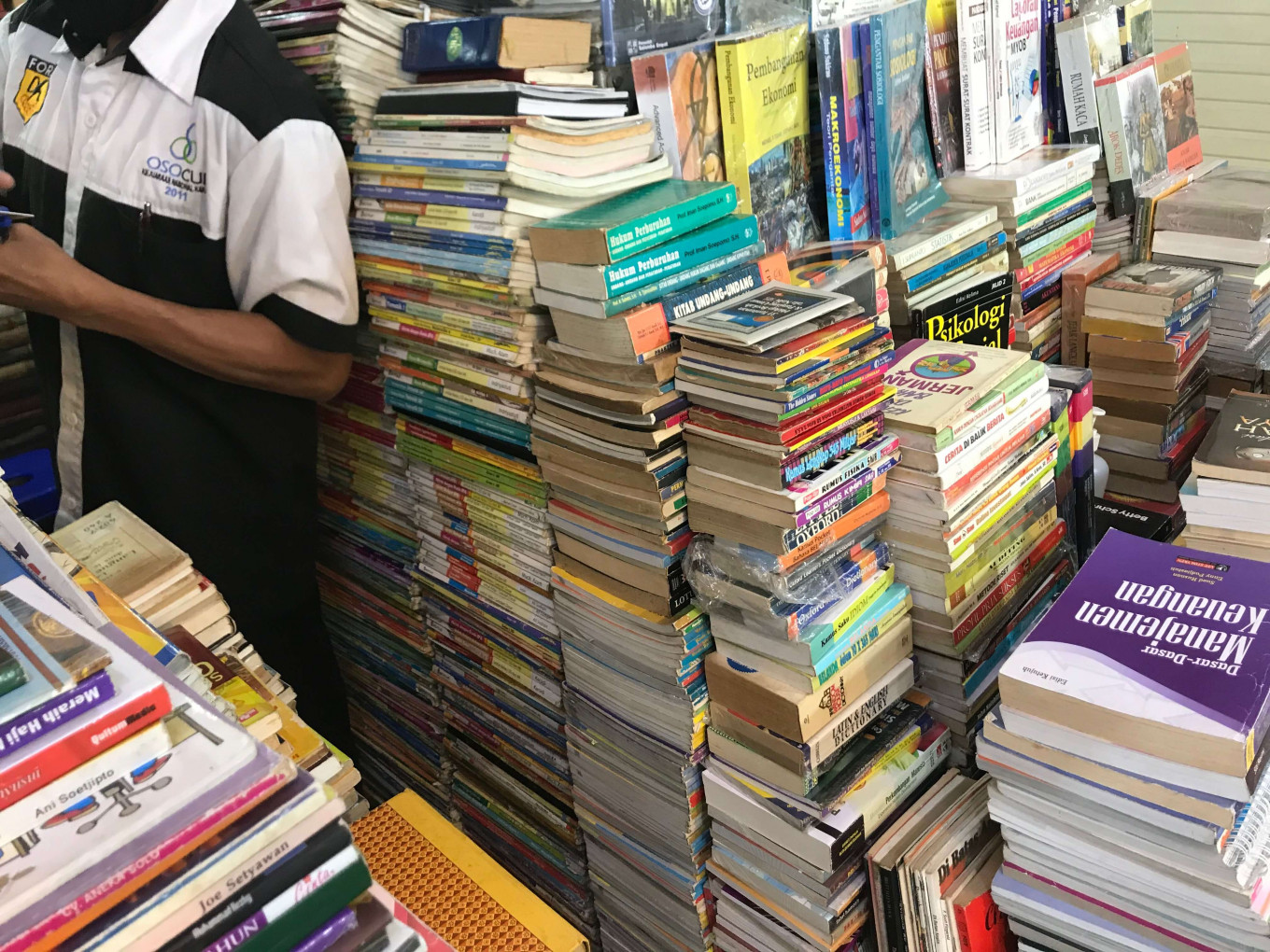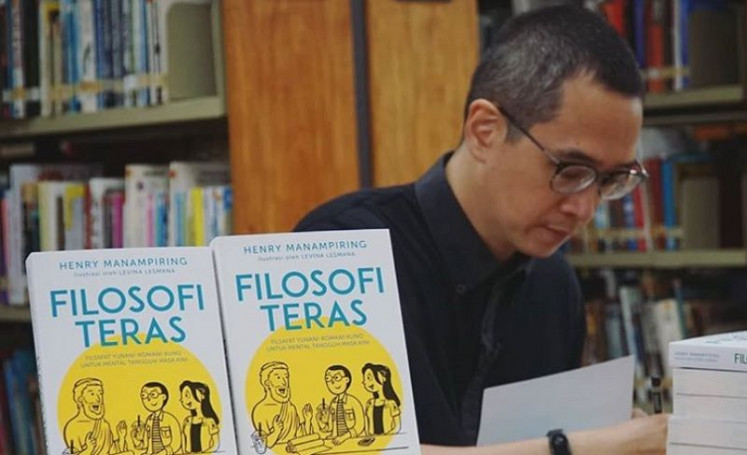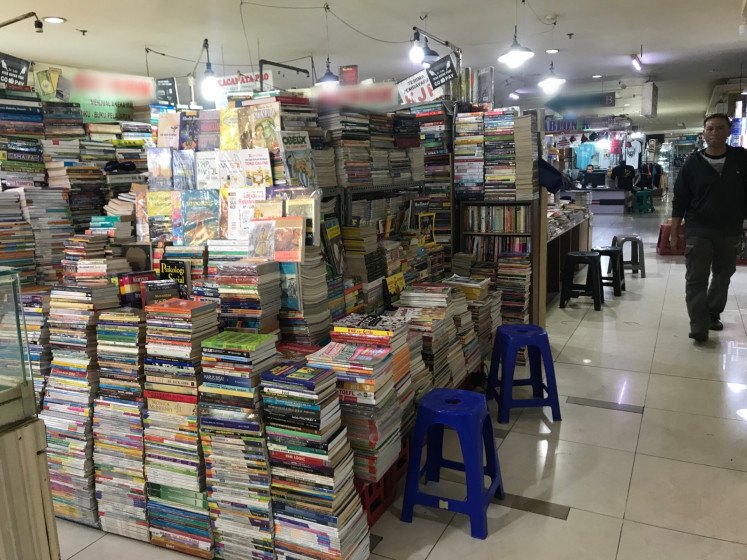Popular Reads
Top Results
Can't find what you're looking for?
View all search resultsPopular Reads
Top Results
Can't find what you're looking for?
View all search resultsBook piracy: Cash-strapped and hungry for knowledge, or simply fraud?
Book piracy has been prevalent in Indonesia and the digital era has made it all the more easy for both buyers and sellers. While book lovers might say they go for pirated books because they're strapped for cash, those in the legitimate industry aren’t buying the excuse. Where do you stand on the issue, and is there a solution?
Change text size
Gift Premium Articles
to Anyone
F
inding pirated versions of books in Indonesia is easy. From kiosks and outlets in shopping centers to a variety of e-commerce platforms that host vendors carrying the illicit goods, those looking can find cheap versions of practically any title, old and new, foreign or Indonesia.
From obvious photocopies to black-and-white scanned prints, and to high-quality reproductions, pirated books come in many shapes and forms to fit every budget.
Many sellers of pirated books resort to digital messaging apps like Telegram to hawk illicit copies of e-books, while book clubs share original e-book files or PDF copies among their members.
For many, getting valuable reading material at the lowest possible price, even free, feels like an achievement. But this is the very reason that the creative industry is in a constant battle against piracy, often by literary fans who should be supporting authors and the industry that provide their livelihood.
Piracy is typically tolerated in the bookselling industry due to a loosely held belief that knowledge should be free, regardless of its source. Aruna (not her real name), a 25-year-old copywriter in Jakarta, is a firm believer that the for-profit business model should never apply to education.
"Knowledge shouldn't be exclusive to those who have the money. I disagree with gatekeeping knowledge behind a paywall. But if the research, text or book needs financial support [...] I would be more inclined to pay a donation," she told The Jakarta Post.
Cost is a big factor for Aruna, an avid reader who grew up in a cash-strapped family like many Indonesians. Accessing pirated books online therefore seemed like the only practical and affordable solution. Tifani (not her real name) is in the same boat, and the 22-year-old fan fiction enthusiast says she has been downloading pirated e-books for more than a decade since junior high.
Unblamable ignorance: Henry Manampiring, who has authored four nonfiction titles, says that many producers of pirated books are oblivious to how their activities hurt the industry. (JP/Courtesy of Gramedia)Both women claimed that they and their many like-minded friends were “selective” about the pirated titles they downloaded, saying that they rarely downloaded pirated books from independent publishers and small-time authors. However, neither could define where they drew the line between relatively unknown and established authors.
"Big titles from big-name authors can do fine without my patronage, but not so for up-and-coming authors. So for the latter and certain favorite authors, I'll spend money," said Aruna.
As for Tifani, she said she only downloaded titles she had previously read. "There's this feeling that I have purchased the books, but sometimes I’ve lost [them] and I want to reread them. So there's no harm in reading their free versions, right?"
Hurting the industry
Ika Natassa, the best-selling author of The Architecture of Love (2016) and Susah Sinyal (Bad signal; 2017), considers the argument “books are expensive” as indefensible, and has frequently spoken out against book piracy on Twitter.
"People always say that they are short on cash to buy books at the store, but there are many other legal ways to obtain books,” Ika, who has eight published titles, told the Post.
“You can borrow [money] from friends or wait a little longer and save up until you can buy the books from the official store. After all, book authors also invest quite a big chunk of their time, sometimes years, to finish a book."
Henry Manampiring, known for The Alpha Girl’s Playbook (2016) and other nonfiction titles, said he faced the same problem, finding pirated versions of his books sold at much lower prices online. Some e-commerce merchants had even pirated his audio books and uploaded them to streaming platforms like YouTube.
"I believe that most of those who pirate [books] are aware of their wrongdoings, but some just fail to draw the line between sharing and copyright infringement. They are deeply oblivious, and this makes it hard to blame them," said Henry, who also works at an advertising agency.
Ika and Henry share the concern that the illicit practice harms the book publishing and distribution ecosystem as a whole.
"Book piracy disincentivizes authors. At some point, there is a chance that they will become discouraged if they are not compensated enough. So it's not only a matter of authors losing their royalties, it's a matter for the entirety of human civilization," said Henry.
Right is right: Best-selling author Ika Natassa doesn't accept affordability as an excuse for buying pirated books. (JP/Courtesy of Ika Natassa)Ika explained that most Indonesian authors only received 10% of their title’s price tag, which meant further repercussions for others who worked in the industry.
"If we think about it, the price of a book pays wages for not only the author, but also all people in the industry. We are paying for the editor, [layout designer], cover designer, staff at the bookstore and publishing company, and many more," she pointed out.
Dionisius Wisnu, public relations officer at publishing giant PT Gramedia Pustaka Utama, explained that the cost structure of producing a title was complex and far-reaching.
"There are many components behind the price tag of a book, from the paper to the ink to invisible costs like IT maintenance and book distribution costs," he said.
Heavenly reward
Ilham (not his real name), 46, has been making and selling pirated books since 2002, primarily at an older Jakarta shopping center known for its rows of small outlets selling secondhand and imported books. He said that publishers often enlisted the help of law enforcement to conduct raids, but many shopkeepers in and around the mall alerted him and other sellers of an impending raid.
He added that the profit he made from selling pirated books at his store, which also sold secondhand books, was “not that much”.
"The pricing is very competitive and readers are looking for the cheapest option available, so sometimes they just duplicate the book on their own," Ilham said.
While the Post also reached out to several online merchants selling hundreds of pirated titles on e-commerce platforms, as well as the platforms’ representatives, many did not respond and those that did were not willing to go on the record. These shops remain active to date, and many have high ratings and good customer reviews.
Asked about the moral dilemma of how book piracy hurts the entire publishing industry, Ilham replied: "I think the publishers have been harming sellers like us. They do flash sales, big discounts and all that to disrupt the pricing standard. So I don't think I owe [anything] to the publisher.”
And what about the authors? "Well, the author might be rewarded in the afterlife for providing free education to the people," Ilham said, grinning.
For Ika, however, this argument in no way justifies book piracy.
"If ideas, knowledge and entertainment were free, who'll pay for the [production costs]?" she said.














